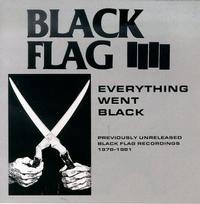Released as both a clearing house and as a stopgap release in 1982, Everything Went Black would end up informing both Black Flag’s past and future. Originally released without the name “Black Flag” on the cover, and only the band members' names, the compilation was SST records attempt to fly under the radar and generate some income during the perilous Unicorn/Black Flag lawsuit. It didn’t work. The band was nabbed in the act and a few members and associates actually wound up doing some time for violating the court order preventing the band from releasing material.
As if these recordings needed any more mythos associated with them! Although Nervous Breakdown would set the underground punk scene on fire, and wile Keith Morris’ sardonic, cagey delivery would go on to impress and inform thousands of future punk rockers, there was a scant four Black Flag tracks to his name prioer to Black. As Black Flag seemed to operate in cycles, the same could be said of Ron Reyes as well as Dez Cadena. Little did fans know that for each vocalist, there was nearly a full album’s worth of material- the same material mind you, but unreleased material none the less.
Except it wasn’t quite the same material for each singer. Granted, almost all these songs had been released previously and many of the songs crop up two or three times on this release. But, Black was a boon in that it showed how each singer brought his own unique perspective to this material. This showed both the strength of the individual vocalists as well as the core material.
Understandably, Morris set the tone for singers and his wiry, tilting vocal ticks filtered through Reyes and Cadena’s versions (and even Rollins on Damaged.) Perhaps like Sinatra, Morris was a master of phrasing and timing. Throughout his side, he suddenly accentuated seemingly random words. But, of course, this wasn’t random- it was Morris drawing an off-balance meaning to these words, implying more than he was saying while also acting as a foil for Greg Ginn bear-trap guitar. It didn’t hurt that Morris had one of the best voices in punk rock. A combination of drugged out street guy, and jester, Morris was at once bemoaning the horrible situation and laughing at the absurdity of it all. He didn’t have the range of, say Dave Vanian, or the vocal control of Glenn Danzig, but his spastic, spitting delivery made these cutting lyrics have appropriate force as well as an intelligence that showed that these songs had more than just a cursory reading to them. And of course, Morris was also a master ad-libber, stapling terse phrases at the end of songs as they fell apart, giving the shambles that much more bite.
For his part, Ron Reyes seemed to set aside the cruel smile of Morris and adopt a more shambling self-destruction. On “Gimme Gimme Gimme,” Reyes was demanding as much as asking. Likewise, the tone of his voice had less broken glass and more surfer kid. While Morris’ wild-eyed rantings seem to come from some other planet, Reyes seemed to be the proxy for the audience member himself. (Of course, Reyes had been an audience member himself, prior.) Perhaps because he had the fewest recorded tracks with the band, Ron Reyes’ contributions were sometimes minimized. This was a mistake, because it could be said that Reyes brought more of a human angle to these songs than any other singer.
Dez Cadena rounded out the release with most tracks under his name. Interestingly, here, his voice hadn’t quite gained the whisky-and-barb wire rasp that iconically filled the two records to his name. Still, even at this early stage, his voice was already rupturing- just check out the ending rant of “Jealous Again.” Cadena’s takes were unique at just how massive and bold his voice sounded. While Morris mastered the part of modulation and shifting, Cadena blasted down the doors at volume 10 all the time.
Similarly, Cadena was the first vocalist to inhabit a truly unhinged character. “Damaged I” went beyond the disgust and rage heard previously, and found Cadena ranting like a madman across a discordant backing. Rollins would go on to assume this role, especially in the band’s later day, and it’s clear that this is where that threaded started. Even on “Louie Louie,” which was ostensibly a party jam, Cadena warped the song into the ravings of somebody who is half a step off the edge and ready to jump.
Against all odds, Black Flag continued and grew despite the change in lead singers. How many bands can claim this title with a single lead singer change- never the less three change overs? Yet, despite the repeated recording of these same songs, Black Flag never really had a definitve singer. Greg Ginn would later on go to claim that this proved that he was the band, and not the singers or anyone else, for that matter. Yet, Everything Went Black demonstrates that Black Flag did not have a definitive singer due to lack of talent- rather, the band had four iconic singers due to a baffling amount of good luck (and perhaps planning). Most bands struggle for one “good” singer. Black Flag had four of the greatest singers ever. How delicious is it that this very thing is proved by a release that, in its credits, foolishly goes out of its way to try diminish those very singers?
